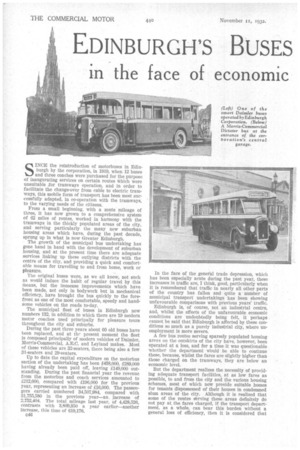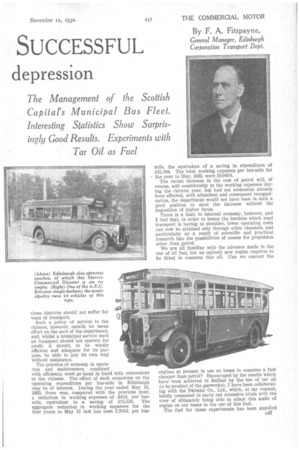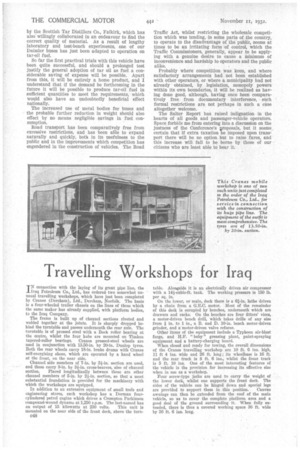EDINBURGH'S BUSES SUCCESSFUL
Page 88

Page 89

Page 90

If you've noticed an error in this article please click here to report it so we can fix it.
in the face of economic depression
The Management of the Scottish Capital's Municipal Bus Fleet.
In Statistics Show Surpris ingly Good Results. Experiments with Tar Oil as Fuel
S, INCE the reintroduction of motorbuses in Edinburgh by the corporation, in 1919, when 12 buses and three coaches were purchased for the purpose of inaugurating services on certain routes which were unsuitable ior tramways operation, and in order to facilitate the change-over from cable to electric tramways, this mobile form of transport has been most successfully adapted, in co-operation with the tramways, to the varying needs of the citizens.
From a small beginning, with a route mileage of three, it has now grown to a comprehensive system of 62 miles of routes, worked in harmony with the tramways in the thickly populated areas of the city, and serving particularly the many new suburban housing areas which have, during the past decade, sprung up in what is now Greater Edinburgh.
• The growth of the municipal bus undertaking has gone hand in hand with the development of suburban housing, and at the present time there are adequate services linking up these outlying districts with the centre of the city, and providing a quick and comfortable means for travelling to and from home, work or pleasure.
The original buses were, as we all know, not such as would induce the habit of regular travel by this Means, but the immense improvements which have been made, not only in bodywork but in mechanical efficiency, have brought the bus quickly to the forefront as one of the most comfortable, speedy and handsome vehicles on the roads to-day.
The municipal fleet of buses in Edinburgh now numbers 132, in addition to which there are 19 modern inotor coaches used principally for pleasure tours throughout the city and suburbs.
During the past three years about 60 old buses have been replaced, and at Mr present moment the fleet is composed principally of modern vehicles of Daimler, Morris-Commercial, A.E.C. and Leyland makes. Most of these vehicles are 32-seaters, there being also a few 31-seaters and 29-seaters.
Up to date the capital expenditure on the motorbus section of the undertaking has been £438,000, £289,000 having already been paid off, leaving £149,000 outstanding. During the past financial year the revenue from the motorbus and coach services amounted to £212,000, compared with £196,000 for the previous year, representing an increase of £16,000. The passengers carried numbered 34,507,984, compared with 31,755,580 in the previous year—an, increase of 2,752,404. The total mileage last year, of 4,428,526, contrasts with 3,809,350 a year earlier—another Increase, this time of 619,176.
c46 In the face of the general trade depression, which has been especially acute during the past year, these increases in traffic are, I think, good, particularly when it is remembered that traffic in nearly all other parts of the country has fallen and quite a number of municipal transport undertakings has been showing unfavourable comparisons with previous years' traffic.
Edinburgh is, of course, not an industrial centre, and, whilst the effects of the unfavourable economic conditions are undoubtedly being felt, it perhaps cannot be said that Edinburgh is affected by these conditions so much as a purely industrial city, where unemployment is more severe.
A few bus routes serving sparsely populated housing areas on the outskirts of the city have, however, been operated at a loss, and for a time it was questionable whether the department would be able to continue these, because, whilst the fares are slightly higher than those charged on the tramways, they are below an economic level.
But the department realizes the necessity of providing adequate transport facilities, at as low fares as possible, to and from the city and the various housing schemes, most of which now provide suitable homes for tenants dispossessed of their houses in condemned slum areas of the city. Although it is realized that some of the routes srving these areas definitely do not pay at the fares charged, if the transport department, as a whole, can bear this burden without a general loss of efficiency, then it is considered that these districts should not suffer for want of transport.
Such a policy of service to the citizens, however, entails no mean effort on the part of the department, and, whilst a municipal service such as transport should not operate for profit, it should, to be wholly efficient and adequate for its purpose, be able to pay its own way without assistance.
The practice of economy in operation and maintenance, combined with efficiency, must go hand in hand with concessions to the citizens. The effect of such economies on the operating expenditure per bus-mile in Edinburgh may be of interest. During the year ended May 15, 1932, there was, Compared with the previous year, a reduction in working expenses of .845d. per busmile, equivalent to a saving of £15,550. The aggregate reduction in working expenses for the four years to May 15 last has been 2.705d. per bus
mile, the equivalent of a saving in expenditure of £42,188. The total working expenses per bus-mile for the year to May, 1932, were 10.045d. The recent increase in the cost of petrol Will, of course, add considerably to the working expenses during the current year, but had not economies already been effected, with attendant and consequent reorganization, the department would not have been in such a good position to meet the increase without the imposition of higher fares.
There is a limit to internal economy, however, and I feel that, in order to lessen the burdens which road transport is baying to shoulder, lower operating costs can now be attained only through other channels, and particularly as a result of scientific and practical research into the possibilities of means for propulsion other than petrol.
We are all familiar with the advance made in the use of oil fuel, but an entirely new engine requires to be fitted to consume this oil. Can we convert the
engines at present in use on buses to consume a fuel cheaper than petrol? Encouraged by the results which havebeen achieved in Belfast by the use of tar oil (a by-product of the gasworks), I have been collaborating with the Daimler Co., Ltd., which, at my request, kindly consented to carry out extensive trials with the view of ultimately being able to adapt this make of engine on our buses to the use of this fuel.
The fuel for these experiments has been supplied c47 by the Scottish Tar Distillers Co., Falkirk, which has also willingly collaborated in an endeavour to find the correct quality of material. As a result of lengthy laboratory and test-bench experiments, one of our Daimler buses has just been adapted to operation on tar-oil fuel.
So far the first practical trials with this vehicle have been quite successful, and should a prolonged test justify the general adoption of tar oil as fuel a considerable saving of expense will be possible. Apart from this, it will be entirely a home product, and I understand that if the demand be forthcoming in the future it will be possible to produce tar-oil fuel in sufficient quantities to meet the requirements, which would also have an undoubtedly beneficial effect nationally.
The increased use of metal bodies for buses and the probable further reduction in weight should also effect by no means negligible savings in fuel consumption.
Road transport has been comparatively free from excessive restrictions, and has been able to expand naturally and quickly, both in its usefulness to the public and in the improvements which competition has engendered in the construction of vehicles. The Road
Traffic Act, whilst restricting the wholesale competition which was tending, in some parts of the country, to operate to the disadvantage of the public, seems at times to be an irritating form of control, which the Traffic Commissioners, generally, appear to be applying with a genuine desire to cause a minimum of inconvenience and hardship to operators and the public alike.
Probably where competition was keen, and where satisfactory arrangements had not been established with other operators, or where a municipality bad not already obtained, by legislation, monopoly powers within its own boundaries, it will be realized as having done good, although, having once been comparatively free from documentary interference, such formal restrictions are not perhaps in such a case altogether welcome.
The Salter Report has raised indignation in the hearts of all goods and passenger-vehicle operators. Space forbids me from entering into a discussion on the justness of the Conference's iiroposals, but it seems. certain that if extra taxation be imposed upon transport there will be no option but to raise fares, and this increase will fall to be borne by those of our citizens who are least able to bear it.




















































































































































